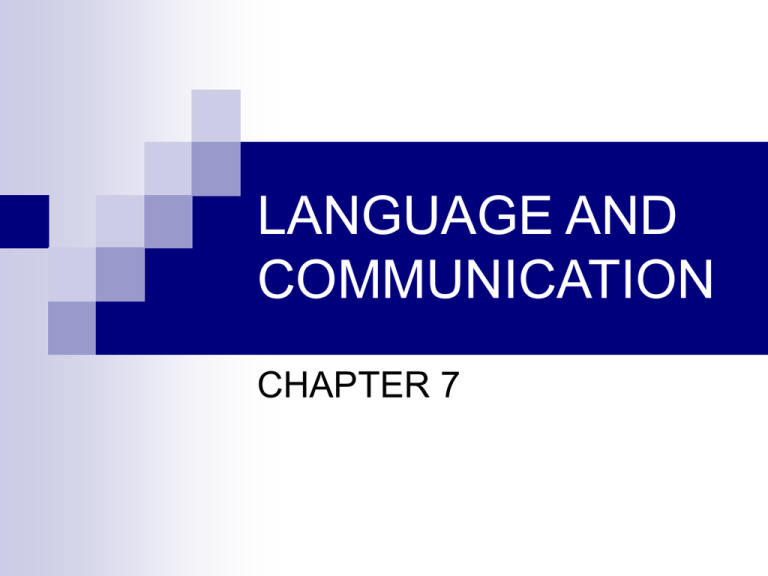LANGUAGE AND COMMUNICATION CHAPTER 7
advertisement

LANGUAGE AND COMMUNICATION CHAPTER 7 LEARNING OBJECTIVES By the end of the lesson, students will be able to 1. Explain the outline of the reading text 2. Predict the main idea of the text Part One Introduction: How does a baby communicate? How does human learn the first language? Why do people need school language such as ELTI, EF and many more? If We Could Talk with the Animals… Pre reading activity Prey grin clicking upright Colony degree vocalize Mammal whale clam Gender mate acquire Pod swagger reassure Primate brain hug Honeybee coyotte shed light on Species chatter feel like Gesture creature head back 2. Guessing Meaning from Context The ways the context of a reading can give us clue are: 1. A definition which locates between commas, parentheses, dashes, or after connecting expression such as in other words, that, is, i.e., And so on. 2. Exercise 5-9 (pp 137-138) provides us the exercises of getting meaning through context. 3. Read the text entitled “If We could talk with the Animals….” Interactions 2, pp. 133-136 3.1. Understanding outline On pages 139-141, it is provided an outline of the text. On the lines write the words or phrase in order to complete the outline. 3.2. Skimming (for main ideas) - As discussed in the previous chapter to find the main ideas you may skim the text quickly. - Read “Parentese”, pages 143-145, and circle the number of the sentence that best expresses the main idea. 3.3. Discuss with your friend the following questions: (p. 142) 1. Do you have a pet (animal)? Have you ever had one? If so, what kind? How does—or did—this animal communicate with you? Could you understand each other? 2. Did anything in the reading surprise you? If so, what? 1. You read that whales make a “clicking” sound. The word click actually imitates the sound itself. Say this word aloud several times. Can you hear it? Part Two Read the following text entitled ”Communication” available on: http://www.uefap.co.uk/reading/underst/test/ communic.htm Find the structure of the text Part Three What the differences between acquiring our first language and learning second (or third) language? Explain your answer and support them with evidences . Read the following text: “International Language” http://www.uefap.co.uk/reading/exercise/ess2/po tter.htm

